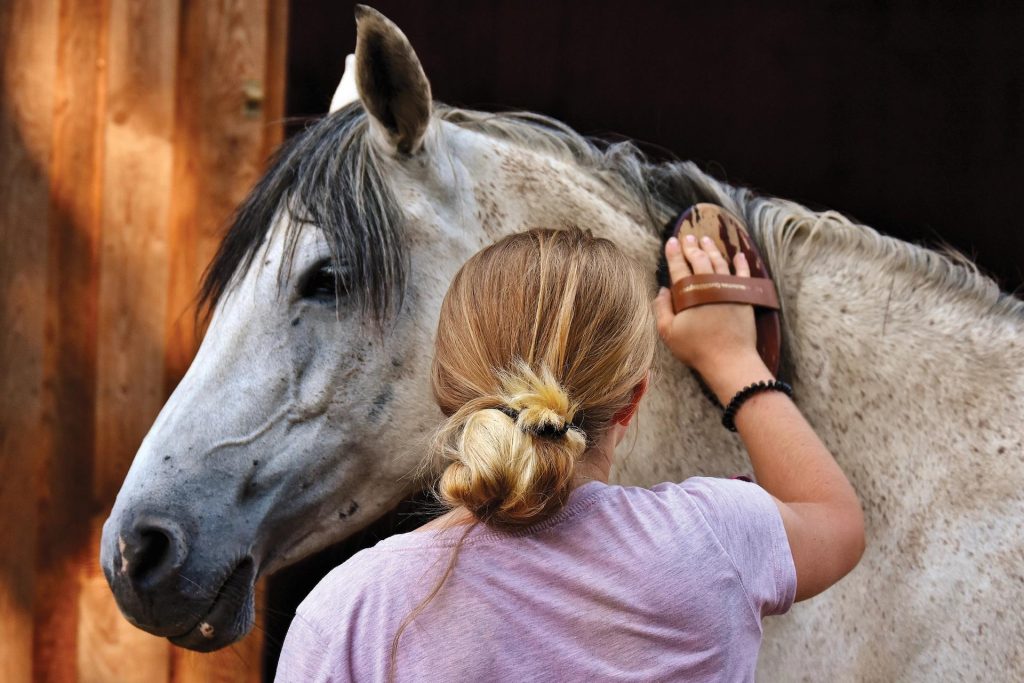Summer can be great fun for your horse, but there are some things you need to watch out for. There are lots of things that can easily happen to your horse as a result of the hot weather, so it’s crucial that you’re paying close attention to their well-being. So, if you want to keep your horse healthy and happy this summer, keep reading and find out which common ailments can occur and how you can avoid them.
Dehydration
Free access to water is vital for avoiding dehydration and it’s important to monitor how much your horse is consuming. In the summer months, excessive sweating caused by exercise or rugging can lead to dehydration. Horses can be reluctant to drink even when dehydrated, but there are ways to tempt them. One top tip is to add cordial or food flavoring to the water – this is especially handy if you are traveling to a show and have to use a source of water that is unfamiliar to your horse. You can also use soaked horse feed to increase your horse’s water intake. Mashes, sugar beet, and other high-fiber feeds can be fed dampened to help your horse consume more water. The grass itself is around 80% water and so horses that turn out are actually consuming more water than those fed hay instead.
If the problem becomes very serious, they may need to be rehydrated by an equine vet. This is particularly important in foals who can become dehydrated very quickly. If in any doubt contact your vet for more advice.
Conjunctivitis
Just like humans, horses’ eyes can become irritated and develop conjunctivitis which is the inflammation of the conjunctiva, or pink mucus membranes of the eye. The swelling can be caused by an infection or other non-infectious causes such as dust, flies, or trauma. Fly masks can help reduce the risk of irritation.
Should you notice your horse’s eyes are inflamed or the presence of discharge, you should consult your vet for advice. It may be necessary to administer some eye drops or creams and your horse may need antibiotics.
Insect Bites
A lot of horses can be hyper-sensitive to insect bites, and this is a problem called Sweet Itch. It tends to occur in the summer as this is when the midges that cause the allergic reaction in the horse are most abundant. When your horse is affected by Sweet Itch, they’ll often display signs of itchiness, and if left untreated, they will rub themselves to the point where skin damage and hair loss occur which may then become infectedUse of fly repellents or special rugs and fly masks are all worth investing in to provide some protection from midges for your horse.
Bruised Soles And Off Pain
Some horses can become very bothered by flies and insects buzzing around their legs and may stamp their feet to try and get rid of them. Doing this repeatedly on hard ground can cause bruising to the soles of their feet which can result in corn. This can also occur if ridden fast or for long periods on really hard ground. Bruising can develop into an abscess and this can be so painful the horse will not be able to bear weight on that leg. A vet or farrier is needed to dig into the hoof and allow the pus in the abscess to be removed. A poultice may need to be applied to draw all the pus out and protect the wound from becoming infected. Horses with very flat or low soles may need special shoes or pads to be applied to give them more protection. This is worth discussing with your farrier if they have repeated problems with bruised soles.
Overheating
One of the main reasons for putting rugs on horses when they are turned out is to keep them clean and dry so you can ride. After all, we know it rains in the UK in the summer months and horses are very good at creating a mud patch to roll in to maximise how dirty they can get! Even a lightweight rug will act as an insulating layer and can result in horses getting too hot. If they sweat when wearing a rug it can increase the risk of rubbing and chafing and, like humans, keeping cool uses energy. The hotter the horse gets, the more energy it will use to cool down. Whilst we don’t want an underweight horse to get cold, do be sure they really need a rug as they will burn energy keeping cool too.
Sunburn
You may not realise it, but horses can actually suffer from sunburn just like the rest of us. Those with pink noses and white coats are more likely to experience it during the summer as their skin is sensitive to UV rays. Using a fly mask or sheet can help massively as well as horse-specific sunscreen. If you’re worried that their sun damage is severe, then it’s always best to speak to a vet and ask them to check them over.
Summer can be a challenging time for horse owners, even more so than winter. This is because of all the ailments that can arise and impact your horse’s health. However, there are steps you can take to avoid them as best you can. Vitamin D from the sun’s rays is essential for their health, so you can’t avoid the sun completely. But if you make sure that they’re taken care of in the sunshine, you’ll be able to keep them happy and free from those pesky summer ailments.

